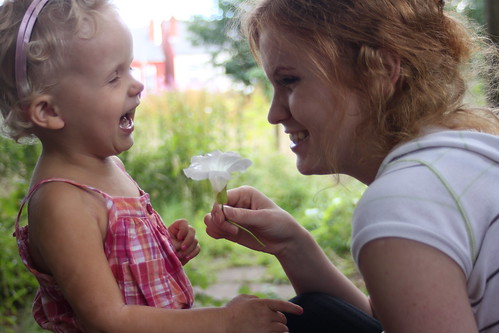Positive Parenting Tips: How to Show Kids They Matter
For whatever reason, kids can often feel as though they are the odd one out - that no one understands them. You know full well that your kids matter. Show them just how much with some positive parenting. Most parents do care and want their kids to know that, but some just aren't sure how to put feelings into action.
Give them choices. Although you may want everything to go a certain way, kids should be a part of family decisions, too. Sometimes - maybe many times - not everyone is going to agree on things. Let the kids decide what to do whenever possible. This shows them their thoughts matter to you. When kids know they matter, they may be more inclined to respect your wishes for decisions you must make. Respect their opinions. Even when their opinions differ from yours - and they will sometimes - respect what your kids think. Things don't always have to go their way. But let them be individuals. Sooner or later your child is going to grow up. He needs to know his voice matters to be respected in the world outside your home. Even inside the home, your child's opinions and insight should count. Give them freedom. There are limits to this for safety reasons, of course. But give your kids some freedom. They don't need to be right next to you at every moment. Trust them to do age-appropriate tasks without your assistance. It can be a parental instinct to be a mother hen or a father lion. That's part of being a parent, but if we don't let them do some things for themselves, they will never learn. Let them teach you about their favorite things. You may be old and wise, but kids have so much to teach us adults. Listen. Let your child know that her interests are important to you. Sometimes what kids are interested in don't line up with those of their parents. Still, you need to be supportive of your child's individuality. Don't try to force your interests on him and don't attempt to keep him from his unless they are harmful in nature. Show affection even when they misbehave. Even when kids misbehave, they still deserve your love. Discipline must take place. But that doesn't mean a hug isn't in order. In fact, that may be exactly what the doctor has ordered. Show your child his feelings matter to you by still showing affection, even in difficult times. *I originally published this via Yahoo Contributor Network
0 Comments
Building a Toddler's Self-Confidence Without Over-Inflating It Toddlers don't have a care in the world, or at least it may seem that way to those of us who have bills and other big responsibilities. But just because your toddler does not have the same stress as you does not mean he or she isn't capable of feeling a little down. Building a toddler's self-esteem is all about patience, understanding and praise. But how do you build self-confidence without making your toddler think he or she is the best creation in the universe? As a veteran mother and former nanny, I've been down this road plenty of times.
Independence is key. This is always my No. 1 method of building self-confidence in toddlers. If they know they can do things for themselves, it helps them feel accomplished. As parents, it can be tempting to do everything for our kids. But remember that each task you do that they are capable of is keeping them from learning and growing. If you want to help, show them how to do it, and then just step back and let them do it. Toddlers can't very well be confident in their abilities if they aren't allowed freedom to practice them. Redirect instead of scolding, when possible. If toddlers do something wrong, it should be made known. But there is no reason to scold or make them feel bad about it. Simply redirect them to a more appropriate activity. Make sure they know why they are being restricted from a certain action or activity, and praise them for transitioning nicely. Like other methods, this only works if you are consistent. Be sure to redirect your toddler each time he or she takes that specific action. Not being allowed to do it is punishment enough. Scolding can destroy their self-esteem and make them feel worthless. By redirecting, you are teaching the lesson but allowing your toddler to remain confident in his or her abilities. Notice the good things and make it obvious. Don't just point out the bad behavior. When your toddler is behaving, let him or her know you are impressed. Building a toddler's self-esteem is essential, but you don't want to overdo it. Be careful not to do this for every single good behavior because this can lead to over-inflation of the ego. But pointing out the good things is important. Do it randomly, and make it genuine. Track goals with a simple chart. When toddlers can visually see something they have achieved, it can be great for the ego. Make a chart of some of the things they are expected to do each day, such as brushing their teeth, reading a book, picking up their toys, making their bed, and more. Use stickers or magnets to mark what has been done each day. When toddlers look at what they have accomplished, their self-esteem will likely rise. Allow them to make choices. Toddlers need to know they are trusted. This is an essential part of building self-esteem. When you're small, it seems like everyone can do things better than you can. Let your toddler make choices on a regular basis. These can be both big and small choices, but be sure they are things your toddler can handle. For instance, let your toddler choose his or her outfit in the morning. When shopping, give your toddler choices, even if that means his or her entire wardrobe turns out purple, like my daughter's. Building a toddler's self-esteem is all about choice and independence. The advice in this article was written by an experienced parent, not a licensed mental health professional. Consult an appropriately licensed health professional if your child shows signs of depression or other health issues. |
Instant Download On Order
Categories
All
Archives
May 2024
|
- Brand Shamans
- Brand Healing
- Inner Healing
-
INTENT-SIVE NATURE
- Content & Brand Elevation
- Healing Jewelry & Talismans
- Bath, Beauty, & Self-Care
- Healing Sessions
- Rituals, Herbs, & Altar Supplies
- Gawwwdess Baby Boutique
- Soul Flame Gifts
- Yoga & Meditation
- Books & Media
- Education & Homeschool Resources
- Home, RV, & Decor
- Clothing
- Pets
- Custom Orders
- Monthly Subscription Boxes
- October Festivals
- FLOW-Key Parenting
- About & Contact
- RV, Nature, & Travel Shamans
- Souls Within
- Life & Home
- Heart 'N Mind Homeschool
- The Homeschooling Mommy
- Books & Authors
- Speak Up!
- Pawsitive Pet Parenting
- Manifesterz
- Gifts In Minutes
- Brand Shamans
- Brand Healing
- Inner Healing
-
INTENT-SIVE NATURE
- Content & Brand Elevation
- Healing Jewelry & Talismans
- Bath, Beauty, & Self-Care
- Healing Sessions
- Rituals, Herbs, & Altar Supplies
- Gawwwdess Baby Boutique
- Soul Flame Gifts
- Yoga & Meditation
- Books & Media
- Education & Homeschool Resources
- Home, RV, & Decor
- Clothing
- Pets
- Custom Orders
- Monthly Subscription Boxes
- October Festivals
- FLOW-Key Parenting
- About & Contact
- RV, Nature, & Travel Shamans
- Souls Within
- Life & Home
- Heart 'N Mind Homeschool
- The Homeschooling Mommy
- Books & Authors
- Speak Up!
- Pawsitive Pet Parenting
- Manifesterz
- Gifts In Minutes



 RSS Feed
RSS Feed





